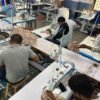Hemp Fiber: The Hidden Gem Of Sustainable Fashion
“Growing hemp as nature designed it is vital to our urgent need to reduce greenhouse gases and ensure the survival of our planet.” Popularly known as the “Emperor Of Hemp” of today’s age, Jack Herer is an American activist and author who strongly believes in the utility of hemp. While he supports the cannabis family, including marijuana, his work toward bringing the hemp revolution worldwide is much more appreciable. Despite being used for centuries, hemp was recently brought back into the market due to its many benefits. Although it has been utilised in various industries, such as food, fashion, and medicine, its main application nowadays is in the lifestyle and fashion sector. Hemp made a comeback in recent decades when the term “sustainability” gained popularity due to the necessity to save Mother Nature from the gripples of pollution, excessive waste disposal, and the depletion of natural resources. We shall discuss how hemp’s amazing qualities have transformed the fashion and lifestyle industries in this article with Echo Earth, a budding pioneer of hemp fabric manufacturers in India. Why is Hemp incredible for fashion apparel brands? Today, many brands are switching to hemp fabrics to get their labels ready. Also, there is a significant growth in the eco-conscious way of living, which increases the demand for hemp clothing. Owing to its unique and natural aesthetics, this new fabric is taking the fashion market by storm. Other than these, there are many compelling reasons behind this switch, which are: Biodegradability: Hemp fabric is highly biodegradable. Once you are done using the outfit, you can discard it in nature without causing any harm to the environment. Durability: Hemp shirts or hemp t-shirts or just fabric are highly durable and long-lasting. You can use it for many years without much wear and tear. Low Carbon Footprint: Today, many big brands and labels are working toward becoming a carbon-neutral company. Hemp is much better than other fabrics, with a huge carbon footprint in the production. It does not use many chemicals in the processing, which makes it a good alternative. Sustainability: The hemp crop yield is much easier with almost no usage of insecticides or pesticides and very minimal water requirement. Versatility: There are no denying that such textile has immense versatility in the fashion industry with budget to luxury clothing. It allows brands to experiment with it because of its easy structure. Overall, hemp fabric is an excellent alternative to cotton or synthetic textiles for many brands as they move toward achieving a carbon-neutral and eco-friendly way of functioning. Understand the texture of Hemp Fabric When we invest in an article of clothing, comfort should always be the topmost priority. To carry an outfit for long hours, it should feel absolutely breathable and soft on our skin. Hemp fabric is a textile that will make you feel lighter and more comfortable. However, the structure of hemp fabric has a certain natural roughness initially because of the presence of lignin. It eventually starts to fade away, and the fabric becomes softer with each wash. It is noticed that even after multiple washes, it does not tend to lose its strength. The fabric is known for its extreme durability and longevity, as discussed in the last section. Many compare hemp fabric to a fine wine that ages gracefully with time. The texture of the fabric improves over time, giving it a luxurious and comfortable appeal. Hemp or Cotton: You decide! Many ask us why we should switch to hemp when cotton is perfect for daily usage and easily available in the market. Let us look into some facts and figures before concluding which one is better: Hemp crops can reach maturity in around 100-120 days, while it takes cotton six months to fully grow. Hemp plantation requires half the water of cotton crops, which makes them highly water-efficient. Hemp cultivation does not need much insecticides or pesticides and less maintenance. Hemp fabric is much stronger and more durable than cotton fabric. Hemp fabric is also resistant to UV rays and is hypoallergenic. Clothing made of cotton or hemp is equally significant, and your choice will only rely on your requirements. But if you choose hemp, you can spread awareness of its advantages to those around you and make a very good, sustainable choice. Large fashion houses and companies can simply transition to hemp to start their lines of sustainable hemp clothing.





